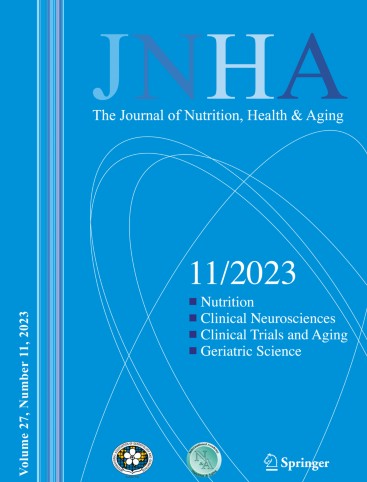MIND-NL饮食、荷兰饮食指南与有认知能力下降风险的老年人群的整体认知功能之间的关系
IF 4
3区 医学
Q1 GERIATRICS & GERONTOLOGY
引用次数: 0
摘要
本研究探讨了荷兰MIND饮食(地中海- dash干预神经退行性延迟,MIND- nl)和荷兰饮食指南(DHD2015-index)与认知能力下降风险老年人全球认知功能之间的关系。设计和设置采用FINGER-NL试验的基线数据进行横断面研究。共有1135名年龄在60-80岁、有认知能力下降风险的老年人参与了分析,他们有完整的饮食数据和完整的神经心理学测试。测量采用经验证的72项食物频率问卷(FFQ)来评估饮食模式的依从性。整体认知功能是通过计算基于神经心理测试电池的四个子测试的综合得分来评估的。应用多元线性回归分析,调整年龄、性别、教育水平、社会经济地位(SES)、体重指数(BMI)、身体活动水平、吸烟状况和心血管危险因素,研究MIND-NL饮食评分与整体认知功能之间的潜在关联,以及dhd2015指数与整体认知功能之间的潜在关联。根据年龄、性别、教育程度、社会经济地位和身体活动进行相互作用和随后的亚组分析。探索性网络分析应用于确定个人饮食摄入成分与整体认知功能之间的联系。结果参与者的中位[IQR]年龄为67[64−71]岁。总体而言,MIND-NL饮食和dhd2015指数与整体认知综合评分均无相关性(β = 0.014, 95%CI: -0.016, 0.045, p = 0.35; β = 0.003, 95%CI: -0.000, 0.006, p = 0.07)。MIND-NL饮食评分与整体认知的相关性受年龄的影响(p - interaction = 0.06), 70岁以下的成年人表现出正相关趋势。虽然没有发现显著的相互作用(pinteraction = 0.28),但在70岁以下的参与者中,DHD2015-index与全球认知之间存在关联(β = 0.004, 95%CI: 0.000, 0.008, p = 0.048)。饮食中水果蔬菜和维生素E的摄入量与整体认知功能呈正相关。在这项研究中,在70岁以下有认知能力下降风险的老年人中,遵守荷兰饮食指南与更好的整体认知功能有关。未来的研究旨在调查纵向关联并确认年龄的调节作用。本文章由计算机程序翻译,如有差异,请以英文原文为准。
The association between the MIND-NL diet, Dutch dietary guidelines, and global cognitive function in an older population at risk for cognitive decline
Objectives
This study examined the association between adherence to the Dutch MIND diet (Mediterranean-DASH Intervention for Neurodegenerative Delay, MIND-NL) and the Dutch dietary guidelines (DHD2015-index) with global cognitive function in older adults at risk of cognitive decline.
Design and setting
A cross-sectional study was conducted using baseline data of the FINGER-NL trial.
Participants
A total of 1,135 older adults, aged 60–80 years, at risk for cognitive decline with complete dietary data and complete neuropsychological tests were included in the analyses.
Measurements
A validated 72-item Food Frequency Questionnaire (FFQ) was used to assess adherence to the dietary patterns. Global cognitive function was assessed by calculating a composite score based on four subtests of a neuropsychological test battery. Multiple linear regression analyses, adjusted for age, sex, education level, socioeconomic status (SES), body mass index (BMI), physical activity level, smoking status, and cardiovascular risk factors, were applied to examine potential associations between MIND-NL diet score and global cognitive function, and between DHD2015-index and global cognitive function. Interaction and subsequent subgroup analyses were conducted based on age, sex, education, SES, and physical activity. Explorative network analyses were applied to identify links between individual dietary intake components and global cognitive function.
Results
The median [IQR] age of the participants was 67 [64−71] years. Overall, neither the MIND-NL diet nor the DHD2015-index was associated with the global cognition composite score (β = 0.014, 95%CI: -0.016, 0.045, p = 0.35 and β = 0.003, 95%CI: -0.000, 0.006, p = 0.07, respectively). The association between MIND-NL diet score and global cognition was moderated by age (pinteraction = 0.06), with adults under 70 years of age showing a positive trend. Although no significant interaction was noted (pinteraction = 0.28), an association was found between DHD2015-index and global cognition in participants aged under 70 years (β = 0.004, 95%CI: 0.000, 0.008, p = 0.048). Dietary intake of fruiting vegetables and vitamin E were positively correlated with global cognitive function.
Conclusion
In this study, adherence to the Dutch dietary guidelines was associated with better global cognitive function among older adults under the age of 70 years at risk of cognitive decline. Future research aims at investigating longitudinal associations and confirming the moderating effect of age.
求助全文
通过发布文献求助,成功后即可免费获取论文全文。
去求助
来源期刊
CiteScore
7.80
自引率
3.40%
发文量
136
审稿时长
4-8 weeks
期刊介绍:
There is increasing scientific and clinical interest in the interactions of nutrition and health as part of the aging process. This interest is due to the important role that nutrition plays throughout the life span. This role affects the growth and development of the body during childhood, affects the risk of acute and chronic diseases, the maintenance of physiological processes and the biological process of aging. A major aim of "The Journal of Nutrition, Health & Aging" is to contribute to the improvement of knowledge regarding the relationships between nutrition and the aging process from birth to old age.

 求助内容:
求助内容: 应助结果提醒方式:
应助结果提醒方式:


